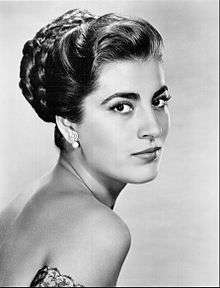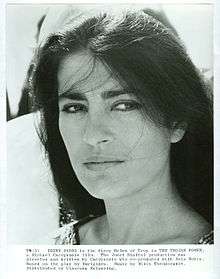Irene Papas
| Irene Papas | |
|---|---|
 Papas in 1956 | |
| Born |
Irene Lelekou 3 September 1926 Chiliomodi, Corinth, Greece |
| Years active | 1948–2003 |
Irene Papas or Irene Pappas (Greek Ειρήνη Παππά; born 3 September 1926) is a retired Greek actress and occasional singer, who has starred in over 70 films in a career spanning more than 50 years. She became famous in Greece, and then an international star of feature films such as The Guns of Navarone and Zorba the Greek. She was a powerful presence as a Greek heroine in films including The Trojan Women, Iphigenia, and played the eponymous parts in Antigone (1961) and Electra.
Personal life
Papas was born as Irini Lelekou (Ειρήνη Λελέκου) in Chiliomodi, outside Corinth, Greece. Her mother was a schoolteacher, and her father taught classical drama.[1] She was educated at the Royal School of Dramatic Art in Athens, taking classes in dance and singing.[2] She serves on the board of directors of the Anna-Marie Foundation.[3] She stated in an interview that her father was of Albanian descent.[4]
Film career

Papas began her film career in Greece, being discovered by Elia Kazan, and achieved widespread fame there. She then starred in internationally renowned films such as The Guns of Navarone (1961) and Zorba the Greek (1964), and critically acclaimed films such as Z (1969). She was a leading figure in cinematic transcriptions of ancient tragedy, portraying Helen in The Trojan Women (1971) opposite Katharine Hepburn, Clytemnestra in Iphigenia (1977), and the eponymous parts in Antigone (1961) and Electra (1962).[5] She appeared as Catherine of Aragon in Anne of the Thousand Days, opposite Richard Burton and Geneviève Bujold in 1969. In 1976, she starred in Mohammad, Messenger of God (also known as The Message) about the origin of Islam, and the message of Mohammad. In 1982, she appeared in Lion of the Desert, together with Anthony Quinn, Oliver Reed, Rod Steiger, and John Gielgud. One of her last film appearances was in Captain Corelli's Mandolin in 2001.[6][2]
The Treccani Enciclopedia Italiana describes Papas as a typical Mediterranean beauty, with a lovely voice both in singing and acting, greatly talented and with an adventurous spirit.[2]
In the view of film critic Philip Kemp, Papas was an awe-inspiring presence, which paradoxically limited her career. He admired her roles in the films of Michael Cacoyannis, including the defiant Helen of Troy in The Trojan Women; the vengeful, grief-stricken Clytemnestra in Iphigenia; and "memorably" as the cool but sensual widow in Zorba the Greek.[5]
The film critic Roger Ebert observed that there were many "pretty girls" in cinema "but not many women", and called Papas a great actress. Ebert noted her uphill struggle, her height limiting the leading men she could play alongside, her accent limiting the roles she could take, and "her unusual beauty is not the sort that superstar actresses like to compete with."[7] Ordinary actors, he suggested, had trouble sharing the screen with Papas. All the same, her presence in many well-known movies, wrote Ebert, inspired "something of a cult".[7]
Theatre career
Papas began her acting career in variety and traditional theatre, in plays by Ibsen, Shakespeare, and classical Greek tragedy, before moving into film in 1951.[2] Later in her career, she took the eponymous role of Medea in a 1973 production of Euripides's play. Reviewing the production in The New York Times, Clive Barnes described her as a "very fine, controlled Medea", smouldering with a "carefully dampened passion", constantly fierce.[8]
Singing
In 1969, the RCA label released Papas' vinyl LP, Songs of Theodorakis (INTS 1033). This has 11 folk songs sung in Greek, with sleeve notes in English by Michael Cacoyannis. A later CD of Greek folk songs, Irene Pappas Sings Mikis Theodorakis, was officially released in 2006 (FM B0002GSA8G), but a wider selection of the songs had been circulating as bootleg tapes for many years. Papas knew Mikis Theodorakis from working with him on Zorba the Greek[5] as early as 1964.
In 1972, she appeared on the album 666 by the Greek rock group Aphrodite's Child on the track "∞" (infinity). She chants "I was, I am, I am to come" repeatedly and wildly over a percussive backing, causing controversy with her "graphic orgasm".[9][10]
In 1979, Polydor released her solo album of eight Greek folk songs entitled Odes, with electronic music performed (and partly composed) by Vangelis Papathanassiou. The lyrics were co-written by Arianna Stassinopoulos. They collaborated again in 1986 for Rapsodies, an electronic rendition of seven Byzantine liturgical hymns, also on Polydor.[11]
Politics
Papas was a member of the Communist Party of Greece (KKE), and in 1967 called for a "cultural boycott" against the "Fourth Reich", meaning the military government of Greece at that time.[12]
Awards and honours
- 1961: 11th Berlin International Film Festival (Best Actress, for the film Antigone)—won[13]
- 1962: Thessaloniki International Film Festival (Best Actress, for the film Elektra)—won
- 1962: Union of Greek Film Critics (Best Actress, for the film Elektra)—won
- 1969: New York Film Critics Circle (Best Supporting Actress, for the film Z)—nominated
- 1971: National Board of Review (Best Actress, for the film The Trojan Women)—won[14]
- 1985: Fennecus Awards (Best Actress in a limited role, for the film Into the Night)—nominated
- 1989: Australian Film Institute (Best Actress, for the film Island)—nominated
- 1993: Hamptons International Film Festival (Distinguished Achievement Award)—won
- 1993: Flaiano Prize for Theatre (Career Award)—won
- 2000: Madrid National Arts Institution (Career Award)—won
- 2000: International Festival Women’s films (Career Award)—won
- 2001: University of Rome (Doctorate in Arts and Letters)—won
- 2002: Woman of Europe Award (Career Award)—won
Filmography
- Fallen Angels (1948 film) (Greek, "Hamenoi angeloi", 1948) as Liana[15]
- Dead City (Greek, "Nekri Politeia", 1951)[5] as Lena
- Torna! (1953)
- The Man from Cairo (1953)[5]
- The Unfaithfuls (Italian, "Le Infideli", 1953)[5]
- Dramma del Casbah (1953)[5]
- Vortice[5]
- Theodora, Slave Empress (Italian, "Teodora, Imperatrice di Bisanzio", 1954)[5]
- Attila (1954)[5]
- Tribute to a Bad Man (1956)[5]
- The Power and the Prize (1956)[5]
- Climax! (1958) (TV)
- Bouboulina (1959)
- The Guns of Navarone (1961) as Maria[5]
- Antigone (1961)[5]
- Electra (1962) as Electra[5]
- The Moon-Spinners (1964) as Sophia[5]
- Zorba the Greek (1964) as the widow[5]
- Zeugin aus der Hölle ("Witness out of Hell", 1966)[5]
- Roger la Honte (1966) as Freda[5]
- We Still Kill the Old Way (1967)[5]
- The Desperate Ones (1967)[5]
- L'Odissea (1968) (TV miniseries)[5]
- The Brotherhood (1968)[5]
- Ecce Homo - I sopravvissuti (1968)
- Z (1969) as Helene[5]
- A Dream of Kings (1969) as Caliope[5]
- Anne of the Thousand Days (1969) as Queen Katherine[5]
- Oasis of Fear (1971)
- The Trojan Women (1971) as Helen of Troy[5]
- Roma Bene (1971) as Elena Teopoulos[5]
- 1931: Once Upon a Time in New York (1972) as Donna Mimma[5]
- Don't Torture a Duckling (Italian, "Non si servizia un paperino", 1972)[5]
- N.P. - Il segreto (1973)
- The Battle of Sutjeska (1973)
- I'll Take Her Like a Father (1974)
- Moses the Lawgiver (Italian, "Mose", 1974) (TV miniseries) as Zipporah[5]
- Mohammad, Messenger of God (1976) as Hind[5]
- Blood Wedding (Spanish, "Bodas de Sangre", 1977)
- Iphigenia (1977) as Clytemnestra[5]
- Christ Stopped at Eboli (1979) as Giulia[5]
- Bloodline (1979) as Simonetta Palazza[5]
- Ring of Darkness (1979)
- Lion of the Desert (1981) as Mabrouka[5]
- L'assistente sociale tutto pepe (1981)
- Eréndira (1983) as the grandmother[5]
- Il disertore (1983) as Mariangela[5]
- Melvin, Son of Alvin (1984)
- Into the Night (1985) as Shaheen Parvizi[5]
- The Assisi Underground (1985)
- Sweet Country (1987)
- Chronicle of a Death Foretold (1987)
- High Season (1987)
- A Child Called Jesus (1987) (TV film)
- Island (1989)
- Nirvana Street Murder (1990)
- Jacob (1994) (TV film)
- Party (1996) as Irene[5]
- The Odyssey (1997) (TV miniseries) as Anticlea[5]
- Anxiety ("Inquietude", 1998) as the mother[5]
- Yerma (1998)[5]
- Captain Corelli's Mandolin (2001) as Drosoula[6]
- A Talking Picture (2003) as Helena
References
- ↑ Profile, filmreference.com; accessed 30 April 2015.
- 1 2 3 4 "PAPAS, Irene, nata Lelekou". Treccani (Enciclopedia Italiana). 1994. Retrieved 28 February 2017.
- ↑ "Press Conference on the developments regarding the 'Anna-Maria' Foundation", greekroyalfamily.org, 28 August 2003.
- ↑ "Aktorja legjendare greke: Jam shqiptare ose gjysmëshqiptare" (in Albanian).
- 1 2 3 4 5 6 7 8 9 10 11 12 13 14 15 16 17 18 19 20 21 22 23 24 25 26 27 28 29 30 31 32 33 34 35 36 37 38 39 40 41 42 43 "Papas, Irene". Encyclopedia.com. Retrieved 27 February 2017.; "Irene Papas". International Dictionary of Films and Filmmakers. Gale Group. 2001.
- 1 2 Elley, Derek (24 April 2001). "Review: ‘Captain Corelli’s Mandolin’". Variety. Retrieved 27 February 2017.
- 1 2 Ebert, Roger (13 July 1969). "Interview with Irene Papas". Retrieved 27 February 2017.
- ↑ Barnes, Clive (18 January 1973). "Stage: Circle Presents New ‘Medea’". The New York Times. Retrieved 27 February 2017.
- ↑ Dome, Malcolm (27 January 2015). "Malcolm Dome looks back on the impact of Aphrodite's Child's mythic prog masterpiece". Retrieved 27 February 2017.
The band's label, Mercury, were certainly left bemused. In fact, they were so horrified by the scope and challenge of the double album that they initially refused to release it. In particular, Papas' graphic orgasm during Infinity struck the wrong chord with them. Eventually, the company relented and agreed to put it out on their Vertigo imprint.
- ↑ Henshaw, Laurie (19 August 1972). "The Greeks have a word for it". Melody Maker. Retrieved 27 February 2017.
- ↑ "Irene Papas - Rapsodies". Vangelismovements.com. Retrieved 2016-11-13.
- ↑ "Irene Pappas Asks Boycott Of Greece's 'Fourth Reich'". The New York Times. 20 July 1967. Retrieved 27 February 2017.
- ↑ "IMDB.com: Awards for Antigone". imdb.com. Retrieved 2010-01-21.
- ↑ "Awards for 1971". National Board of Review. Archived from the original on 16 March 2004. Retrieved 8 March 2017.
- ↑ "Irene Papas". Cinemagraphe. Retrieved 1 March 2017.
External links
- Irene Papas on IMDb
- Irene Papas at the Internet Broadway Database
